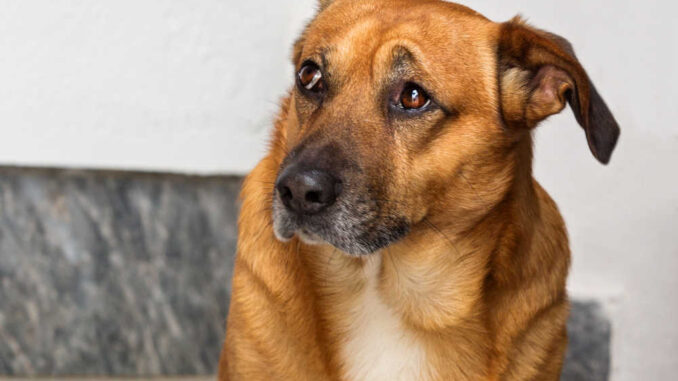
This article was updated on March 14th, 2024

It can be unsettling to see your senior suddenly pacing and becoming restless. Rather than snooze on the sofa, your senior dog is suddenly on edge. They may lie down for a few seconds, only to get back up and start walking about again. They might seem tired, but they’re still struggling to stay still. You may also notice other signs such as whining, barking, and looking to their owner for reassurance. In this article, our veterinarian Dr. Linda Simon shares how to help your dog.
“It’s not uncommon that a senior pet owner will contact me about their dog who is becoming restless when they never were before. Pacing and restlessness are some of the most common signs that a senior is struggling in some way, for example because of pain or anxiety.”
Is your senior dog restless and pacing? 5 things you should know:
1. To help your dog, you need to identify the cause of their pacing
How we treat a restless dog will depend on the cause of their signs. It is crucial we determine why a dog is restless, otherwise, treating the issue can prove a very difficult task indeed.
For example, if a dog is restless because they’re anxious about fireworks overhead, bringing them out for a long night-time walk is likely to make things much worse. However, a long walk may be just the ticket for a bored and restless Springer Spaniel who has not had any exercise that day.
Your dog’s restlessness could also be due to a serious medical issue, as explained in the next section.
2. The most likely reasons include: pain, anxiety, dementia, or simply boredom
It can be tricky to pinpoint the reason why your dog’s behavior has suddenly changed. Some of the most common causes in our golden oldies include:
1. Pain or a source of discomfort
Pain and constant aches make it hard for your senior furry companion to settle and relax. Each time they feel a twinge, they may stand up or pace to take their mind off it.
“Sadly, as a dog ages, it is not uncommon for them to start developing medical issues. A number of these medical problems, including arthritis and dental disease, can cause chronic pain. The issue is that dogs are quite good at hiding pain. A dog with a stiff leg won’t stop walking, they’ll try their best to keep going. Similarly, a dog with toothache is rarely going to stop eating.”
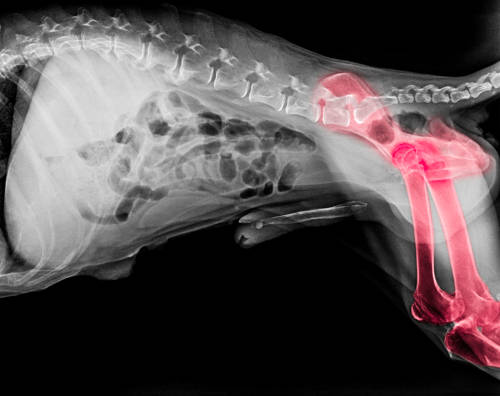
A general vet check is a good idea. As a rule of thumb, seniors should be examined at least twice a year. Your vet can perform a thorough physical exam to pinpoint any source of discomfort. Treatment will vary based on the source; for example, it may include dental cleaning or long-term pain relief.
Arthritis is a common culprit with older dogs: studies show that it affects up to 80% of senior dogs. The disease causes joint pain and stiffness, leading to restlessness and discomfort as dogs struggle to move to find a comfortable position. Learn more about arthritis & senior dogs.
2. Dog dementia
Dementia is very common in senior dogs, affecting at least 45% of those aged 13 and older. The signs of canine dementia can be vague and hard to pinpoint. They also vary from patient to patient.
More frequently seen signs include being clingy, a personality change, and restlessness—particularly at night. Some dogs will also become more anxious and forget the training they used to know. This can include house training, so indoor accidents are not uncommon.
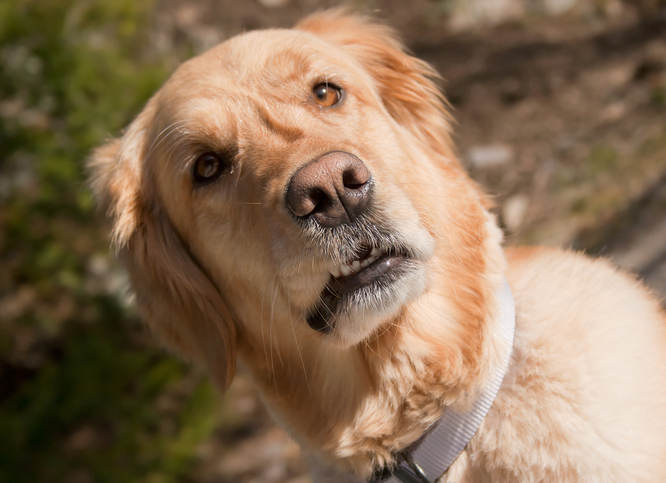
If you think your dog has developed dementia, book them in for a vet check. This way, your vet can rule out other potential causes (such as toxin buildup from liver or kidney disease).
Learn more about dementia in dogs and how to help your dog.
“While we cannot cure canine dementia, your vet will discuss management strategies including brain training games and keeping routines in your dog’s life as much as possible. There are also medications, such as Propentofylline, which can be prescribed. “
3. Anxiety due to a phobia, such as fireworks or a storm
Did you know that new phobias are common in older dogs, who can feel more vulnerable as their senses diminish? If your dog starts pacing and becomes restless, pause to listen. If you hear local wildlife, a noisy storm, or fireworks, it may be that these are causing your dog to feel unsettled.
It helps to try and shut out these noises. Using thick curtains, music from the radio, or noise from the TV may help. Some nervous dogs will also benefit from calming products such as an Adaptil collar or plug-in, as well as calming supplements added to their food each day.
A vet’s opinion is wise if the anxiety is worsening or is not something you feel like your dog is coping well with. Some dogs may need stronger, prescription medicine. Learn more about anxiety in senior dogs.
4. Generalized anxiety
Some dogs are genetically more prone to anxiety. This is particularly true of certain breeds, including the Cocker Spaniel, Staffordshire Bull Terrier, and Bichon Frisé. A dog who is anxious when young can develop a worsening of their anxiety when older.

Anxiety can manifest in a range of ways, including restlessness, destructive behavior, and constant barking.
Frustratingly, anxiety is not an easy problem to address. It’s wise to book an appointment with a vet or canine behaviorist to discuss strategies. This will usually include keeping a set routine, not leaving your dog alone for too long, keeping your pooch mentally stimulated, providing lots of exercise, and potentially medical therapy. Learn more about anxiety in senior dogs.
5. Boredom or a lack of exercise
Even the most confident and well-balanced dog can become restless and worried when they’re not given enough to do. Working dogs, in particular, like Collies, Terriers, and Spaniels, struggle when not stimulated enough.
While older dogs may not be as active as they used to be, they still need consistent exercise. This is not only good to keep their joints supple and to prevent weight gain, but it also helps keep their mind ticking. On top of exercise, we want to provide lots of mental stimulation in the form of mini-training sessions, brain games, chews, and food puzzles. View our favorite Senior Dog Toys.
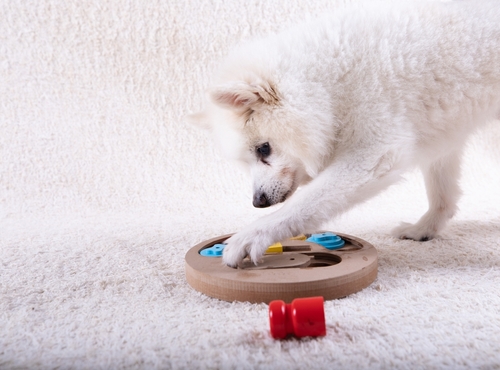
3. Keep an eye out for these other common symptoms associated with pacing in senior dogs
Restlessness is something you’ll likely ‘sense’ from your dog. Their anxiety may put you on edge, too, as they fail to relax and settle down. As well as pacing and moving about more, we may also see:
• Increased panting and breathing rate
• Difficulty sleeping and staying asleep
• Agitation and vocalization
• Destructive behavior
• Acting clingy or needy
• Refusal to eat treats or engage in play
4. Home remedies to calm senior dogs who refuse to rest
While several of the causes of restlessness are best addressed by a vet, there are things we can do from home that should help. For example:
• Providing regular exercise and mental stimulation: It is all too common for owners to forget about this as a dog ages, but this sort of thing is just as important for elderly canines. View our recommendations for the best toys for senior dogs.
• Quality nutrition and hydration: Senior dogs should be fed a senior diet, that meets all of their nutritional needs. We also want to ensure they’re being fed the right amount so they’re not overweight. Being overweight can contribute to joint pain and panting. Learn more about nutrition and senior dogs.
• Comfortable sleeping area and environment: Just like you and I, dogs need a cozy and relaxing place to fall asleep. Ideally, they want a padded bed and a darkened room that is not too noisy. If there are younger pets in the home, consider keeping them away at bedtime.
• Bonding and socialization: All dogs crave human companionship and this can become even more important for them in their older age. Even if this is just a cuddle on the sofa or a short grooming session, your dog will thank you for it.
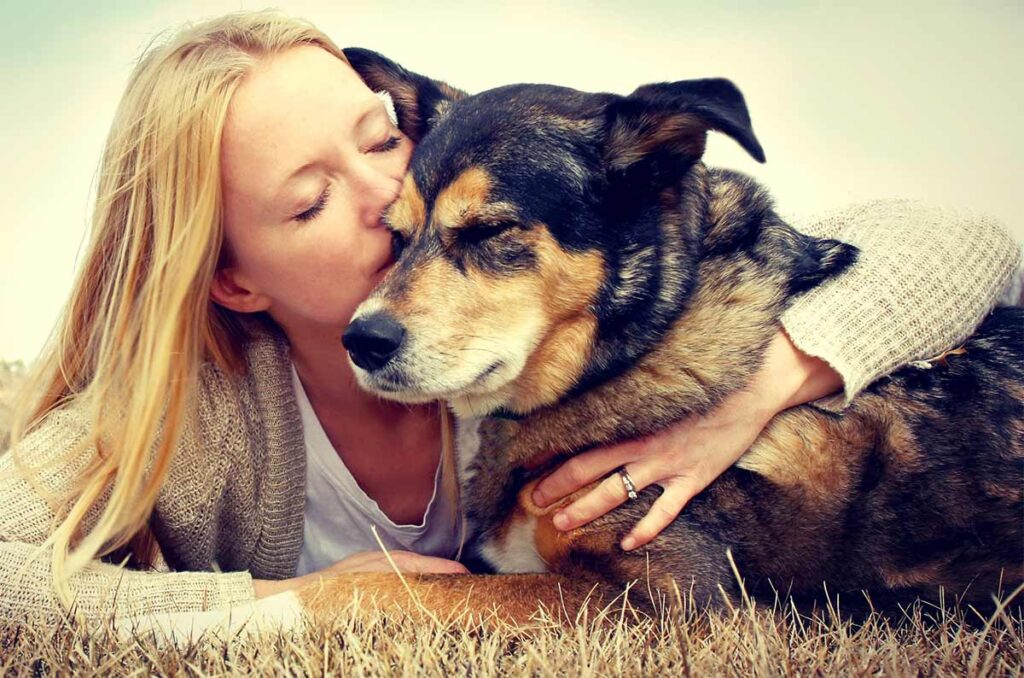
5. Schedule a vet appointment if your dog becomes restless
As we have seen, a senior dog suddenly becoming restless could be a sign of a medical issue, such as anxiety or canine dementia. If the home remedies listed above don’t work well for your dog, don’t delay veterinary help! Your veterinarian will likely be able to help with treatments or recommendations for lifestyle changes. Schedule a vet appointment for a physical exam, and to discuss what has been going on.
Frequently Asked Questions
Can pacing be a sign of pain in senior dogs?
Absolutely, pacing is one of the most common signs that a senior is struggling in some way. Other signs can include stiff movement, a reluctance to exercise like before, muscle wastage, and excessive joint licking.
Is it normal for senior dogs to be restless and agitated?
No, this is not normal and does indicate that there is an issue. If you’ve noticed restlessness in your canine companion, it is best to raise this issue with their vet and have them in for a check-up.
Disclaimer: This website's content is not a substitute for veterinary care. Always consult with your veterinarian for healthcare decisions. Read More.



Be the first to comment